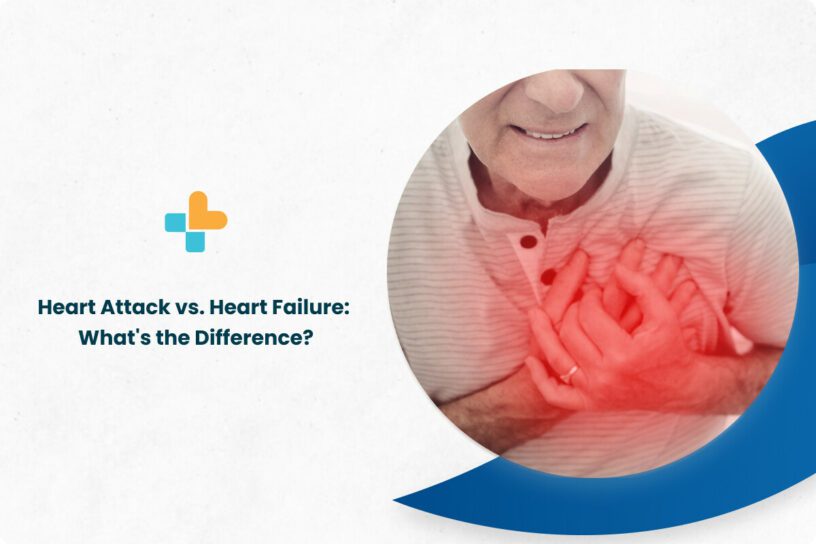Heart attack and heart failure are two serious conditions that can have serious consequences for your health. While they may seem similar, they are actually quite different and require different treatments. In this article, we’ll explain the differences between heart attack and heart failure and discuss what causes each condition.
Heart Attack
A heart attack occurs when the blood flow to a section of the heart is blocked. This can be caused by a blockage in a coronary artery, which supplies blood to the heart muscle. When the heart doesn’t receive enough oxygen and nutrients, the heart muscle can become damaged or die.
Symptoms of a heart attack may include chest pain, shortness of breath, nausea, and cold sweats. If you suspect you or someone else is experiencing a heart attack, it is important to call 911 or seek emergency medical help immediately.
Heart Failure
Heart failure, on the other hand, is a condition in which the heart is unable to pump blood effectively. This can be caused by a number of factors, such as high blood pressure, coronary artery disease, and heart valve problems. Heart failure can also be a result of a previous heart attack.
Symptoms of heart failure may include shortness of breath, fatigue, swelling in the legs, and a rapid or irregular heartbeat. Heart failure is a chronic condition that can be managed with medications, lifestyle changes, and in some cases, surgery.
While heart failure and heart attack are separate conditions, heart failure can increase the risk of a heart attack. This is because the weakened heart may not be able to pump blood effectively, leading to a build-up of plaque in the coronary arteries. If a blockage occurs in one of these arteries, it can lead to a heart attack.
There are several factors that can increase the risk of heart failure, including:
- Coronary artery disease: This is a condition in which the coronary arteries become narrowed or blocked due to the buildup of plaque. This can decrease the amount of blood and oxygen that reaches the heart muscle, leading to heart failure.
- High blood pressure: High blood pressure can put extra strain on the heart and increase the risk of heart failure.
- Heart valve problems: Heart valves help regulate the flow of blood in the heart. If a valve becomes damaged or doesn’t function properly, it can lead to heart failure.
- Cardiomyopathy: This is a condition in which the heart muscle becomes weakened or enlarged. It can lead to heart failure if not treated.
- Heart attack: A heart attack can damage the heart muscle and increase the risk of heart failure.
- Other conditions: Diabetes, obesity, and sleep apnea are also associated with an increased risk of heart failure.
Can Heart Failure Cause a Heart Attack?
While heart failure and heart attack are separate conditions, heart failure can increase the risk of a heart attack. This is because the weakened heart may not be able to pump blood effectively, leading to a build-up of plaque in the coronary arteries. If a blockage occurs in one of these arteries, it can lead to a heart attack.
What Causes Heart Failure?
There are several factors that can increase the risk of heart failure, including:
- Coronary artery disease: This is a condition in which the coronary arteries become narrowed or blocked due to the buildup of plaque. This can decrease the amount of blood and oxygen that reaches the heart muscle, leading to heart failure.
- High blood pressure: High blood pressure can put extra strain on the heart and increase the risk of heart failure.
- Heart valve problems: Heart valves help regulate the flow of blood in the heart. If a valve becomes damaged or doesn’t function properly, it can lead to heart failure.
- Cardiomyopathy: This is a condition in which the heart muscle becomes weakened or enlarged. It can lead to heart failure if not treated.
- Heart attack: A heart attack can damage the heart muscle and increase the risk of heart failure.
- Other conditions: Diabetes, obesity, and sleep apnea are also associated with an increased risk of heart failure.
How to Prevent Heart Failure?
There are several steps you can take to reduce your risk of heart failure:
- Manage underlying health conditions: If you have a condition such as high blood pressure or diabetes, it is important to manage it effectively. This may involve taking medications, making lifestyle changes, or both.
- Eat a healthy diet: A diet rich in fruits, vegetables, and whole grains can help lower your risk of heart failure. Avoiding processed foods and foods high in salt, sugar, and saturated fat can also be beneficial.
- Exercise regularly: Regular physical activity can help strengthen your heart and reduce your risk of heart failure. Aim for at least 30 minutes of moderate-intensity exercise
Why Choose Ayu Health?
Ayu Health are the most trusted chain of hospitals in India with highly experienced doctors across several specialties. As healthcare providers, we are committed to providing our patients with high-quality care at an affordable cost. Ayu Health have expert cardiologists who deliver superior patient care for those suffering from various types of heart-related ailments.
Our doctors at Ayu Health on average hold 15+ years of experience in rendering efficient patient services. If you suspect any unusual symptoms, do seek immediate medical attention and receive the treatment on time. Call us at 08069489584 to know more.
Our Hospital Locations
Cardiac Surgery Hospitals in Chandigarh | Cardiac Surgery Hospitals in Bangalore | Cardiac Surgery Hospitals in Jaipur | Cardiac Surgery Hospitals in NCR | Cardiac Surgery Hospitals in Hyderabad
Our Doctors
Cardiac Surgery Doctors in Chandigarh | Cardiac Surgery Doctors in Bangalore | Cardiac Surgery Doctors in Jaipur | Cardiac Surgery Doctors in NCR | Cardiac Surgery Doctors in Hyderabad
About the Author

Dr. Magesh Balakrishnan
Dr. Magesh Balakrishnan is a renowned cardiologist currently practicing at Ayu Health, Bangalore.
He has 16 years of experience in this field. He has excellent skills in performing all cardiac diagnostic procedures/ tests. He has performed emergency and elective angiographies and angioplasties, device implantation (Pacemaker, AICD & CRT)




